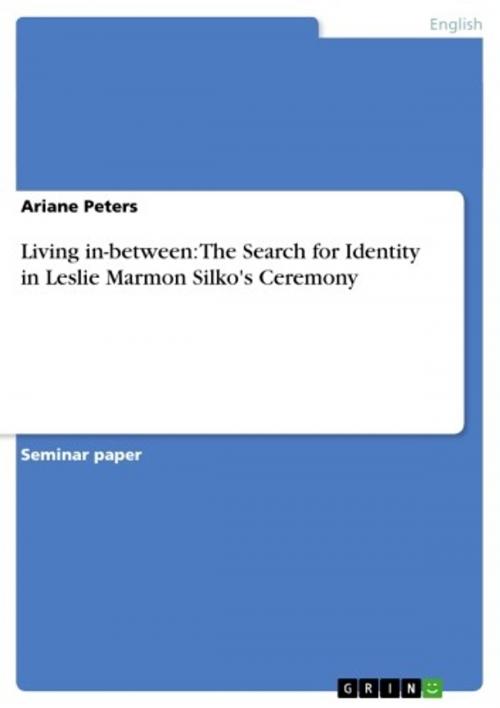Living in-between: The Search for Identity in Leslie Marmon Silko's Ceremony
Nonfiction, Entertainment, Drama, Anthologies| Author: | Ariane Peters | ISBN: | 9783638266246 |
| Publisher: | GRIN Verlag | Publication: | April 7, 2004 |
| Imprint: | GRIN Verlag | Language: | English |
| Author: | Ariane Peters |
| ISBN: | 9783638266246 |
| Publisher: | GRIN Verlag |
| Publication: | April 7, 2004 |
| Imprint: | GRIN Verlag |
| Language: | English |
Seminar paper from the year 2003 in the subject American Studies - Literature, grade: 1,3 (A), Ernst Moritz Arndt University of Greifswald (Institute for Anglistics/American Studies), language: English, abstract: Although Leslie Marmon Silko's complete works have received exemplary reviews, Ceremony seems to be the most talked about and recognized for its literary achievement. One reason for this large attention is the strange narrative form due to the combination of the Indian 'storytelling', myth, poetry and a plot that takes place in a modern western1 environment. Another reason for the remarkable success of this novel is Silko's way to show the negative repercussions on Native Americans caused by racism, alcoholism, dislocation, poverty as well as the industrial exploitation of the land. In this paper I will discuss one of the principal themes presented in Leslie Silko's Ceremony: the issue of Native American identity. In the first part I will briefly introduce the characters of Tayo and Rocky, two Native Americans who grew up on a reservation for the Laguna Pueblo in New Mexico. After that I will examine the similarities between these two young men who both take part in the Second World War and make horrible experiences. In the main part of this paper I will try to find out the differences between Tayo and Rocky in order to explain their different ways of searching their own identity. Furthermore I will explore the sources of Tayo's selfdestructive behaviour and his problem of alienation. Therefore I will have to ponder on the following questions: How does the white culture influence these characters? Do both men suffer from the loss of Indian self-esteem? What are the effects of internalized racism and colonization on the health of Tayo? Why is Tayo able to return to the community to lead a stable and productive life? In the final comment there will be a concluding assessment and a summary of the theme.
Seminar paper from the year 2003 in the subject American Studies - Literature, grade: 1,3 (A), Ernst Moritz Arndt University of Greifswald (Institute for Anglistics/American Studies), language: English, abstract: Although Leslie Marmon Silko's complete works have received exemplary reviews, Ceremony seems to be the most talked about and recognized for its literary achievement. One reason for this large attention is the strange narrative form due to the combination of the Indian 'storytelling', myth, poetry and a plot that takes place in a modern western1 environment. Another reason for the remarkable success of this novel is Silko's way to show the negative repercussions on Native Americans caused by racism, alcoholism, dislocation, poverty as well as the industrial exploitation of the land. In this paper I will discuss one of the principal themes presented in Leslie Silko's Ceremony: the issue of Native American identity. In the first part I will briefly introduce the characters of Tayo and Rocky, two Native Americans who grew up on a reservation for the Laguna Pueblo in New Mexico. After that I will examine the similarities between these two young men who both take part in the Second World War and make horrible experiences. In the main part of this paper I will try to find out the differences between Tayo and Rocky in order to explain their different ways of searching their own identity. Furthermore I will explore the sources of Tayo's selfdestructive behaviour and his problem of alienation. Therefore I will have to ponder on the following questions: How does the white culture influence these characters? Do both men suffer from the loss of Indian self-esteem? What are the effects of internalized racism and colonization on the health of Tayo? Why is Tayo able to return to the community to lead a stable and productive life? In the final comment there will be a concluding assessment and a summary of the theme.















